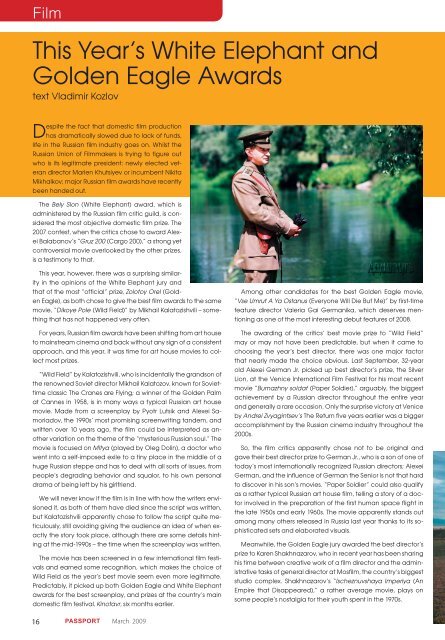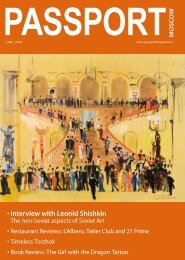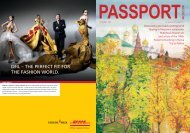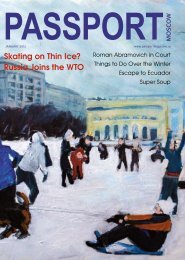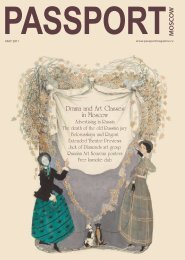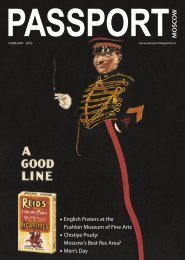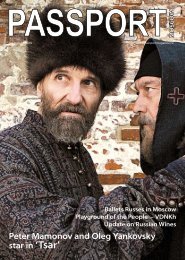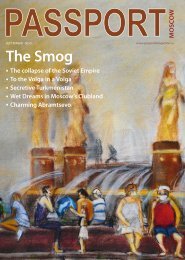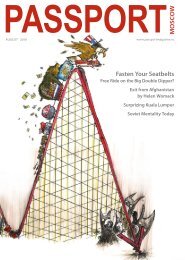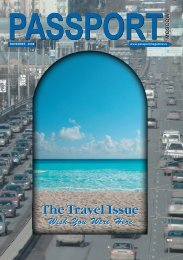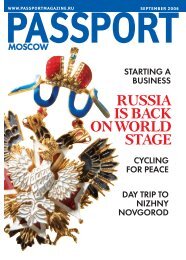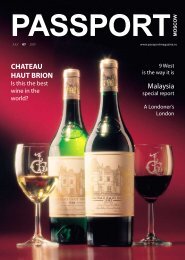A Truly Significant Holiday - Passport magazine
A Truly Significant Holiday - Passport magazine
A Truly Significant Holiday - Passport magazine
Create successful ePaper yourself
Turn your PDF publications into a flip-book with our unique Google optimized e-Paper software.
Film<br />
This Year’s White Elephant and<br />
Golden Eagle Awards<br />
text Vladimir Kozlov<br />
Despite the fact that domestic film production<br />
has dramatically slowed due to lack of funds,<br />
life in the Russian film industry goes on. Whilst the<br />
Russian Union of Filmmakers is trying to figure out<br />
who is its legitimate president: newly elected veteran<br />
director Marlen Khutsiyev or incumbent Nikita<br />
Mikhalkov; major Russian film awards have recently<br />
been handed out.<br />
The Bely Slon (White Elephant) award, which is<br />
administered by the Russian film critic guild, is considered<br />
the most objective domestic film prize. The<br />
2007 contest, when the critics chose to award Alexei<br />
Balabanov’s “Gruz 200 (Cargo 200),” a strong yet<br />
controversial movie overlooked by the other prizes,<br />
is a testimony to that.<br />
This year, however, there was a surprising similarity<br />
in the opinions of the White Elephant jury and<br />
that of the most “official” prize, Zolotoy Orel (Golden<br />
Eagle), as both chose to give the best film awards to the same<br />
movie, “Dikoye Pole (Wild Field)” by Mikhail Kalatozishvili – something<br />
that has not happened very often.<br />
For years, Russian film awards have been shifting from art house<br />
to mainstream cinema and back without any sign of a consistent<br />
approach, and this year, it was time for art house movies to collect<br />
most prizes.<br />
“Wild Field” by Kalatozishvili, who is incidentally the grandson of<br />
the renowned Soviet director Mikhail Kalatozov, known for Soviettime<br />
classic The Cranes are Flying; a winner of the Golden Palm<br />
at Cannes in 1958, is in many ways a typical Russian art house<br />
movie. Made from a screenplay by Pyotr Lutsik and Alexei Samoriadov,<br />
the 1990s’ most promising screenwriting tandem, and<br />
written over 10 years ago, the film could be interpreted as another<br />
variation on the theme of the “mysterious Russian soul.” The<br />
movie is focused on Mitya (played by Oleg Dolin), a doctor who<br />
went into a self-imposed exile to a tiny place in the middle of a<br />
huge Russian steppe and has to deal with all sorts of issues, from<br />
people’s degrading behavior and squalor, to his own personal<br />
drama of being left by his girlfriend.<br />
We will never know if the film is in line with how the writers envisioned<br />
it, as both of them have died since the script was written,<br />
but Kalatozishvili apparently chose to follow the script quite meticulously,<br />
still avoiding giving the audience an idea of when exactly<br />
the story took place, although there are some details hinting<br />
at the mid-1990s – the time when the screenplay was written.<br />
The movie has been screened in a few international film festivals<br />
and earned some recognition, which makes the choice of<br />
Wild Field as the year’s best movie seem even more legitimate.<br />
Predictably, it picked up both Golden Eagle and White Elephant<br />
awards for the best screenplay, and prizes at the country’s main<br />
domestic film festival, Kinotavr, six months earlier.<br />
16<br />
March 2009<br />
Among other candidates for the best Golden Eagle movie,<br />
“Vse Umrut A Ya Ostanus (Everyone Will Die But Me)” by first-time<br />
feature director Valeria Gai Germanika, which deserves mentioning<br />
as one of the most interesting debut features of 2008.<br />
The awarding of the critics’ best movie prize to “Wild Field”<br />
may or may not have been predictable, but when it came to<br />
choosing the year’s best director, there was one major factor<br />
that nearly made the choice obvious. Last September, 32-year<br />
old Alexei German Jr. picked up best director’s prize, the Silver<br />
Lion, at the Venice International Film Festival for his most recent<br />
movie “Bumazhny soldat (Paper Soldier),” arguably, the biggest<br />
achievement by a Russian director throughout the entire year<br />
and generally a rare occasion. Only the surprise victory at Venice<br />
by Andrei Zvyagintsev’s The Return five years earlier was a bigger<br />
accomplishment by the Russian cinema industry throughout the<br />
2000s.<br />
So, the film critics apparently chose not to be original and<br />
gave their best director prize to German Jr., who is a son of one of<br />
today’s most internationally recognized Russian directors; Alexei<br />
German, and the influence of German the Senior is not that hard<br />
to discover in his son’s movies. “Paper Soldier” could also qualify<br />
as a rather typical Russian art house film, telling a story of a doctor<br />
involved in the preparation of the first human space flight in<br />
the late 1950s and early 1960s. The movie apparently stands out<br />
among many others released in Russia last year thanks to its sophisticated<br />
sets and elaborated visuals.<br />
Meanwhile, the Golden Eagle jury awarded the best director’s<br />
prize to Karen Shakhnazarov, who in recent year has been sharing<br />
his time between creative work of a film director and the administrative<br />
tasks of general director at Mosfilm, the country’s biggest<br />
studio complex. Shakhnazarov’s “Ischeznuvshaya Imperiya (An<br />
Empire that Disappeared),” a rather average movie, plays on<br />
some people’s nostalgia for their youth spent in the 1970s.


